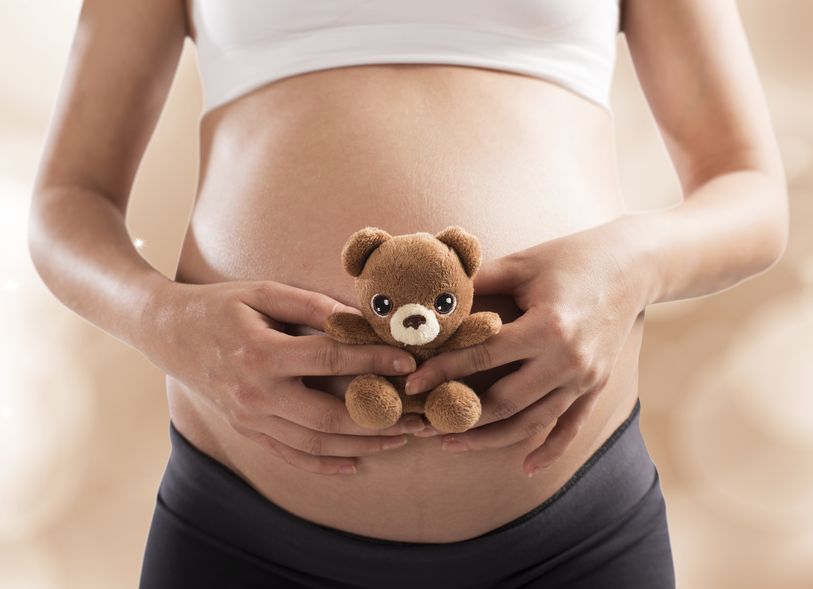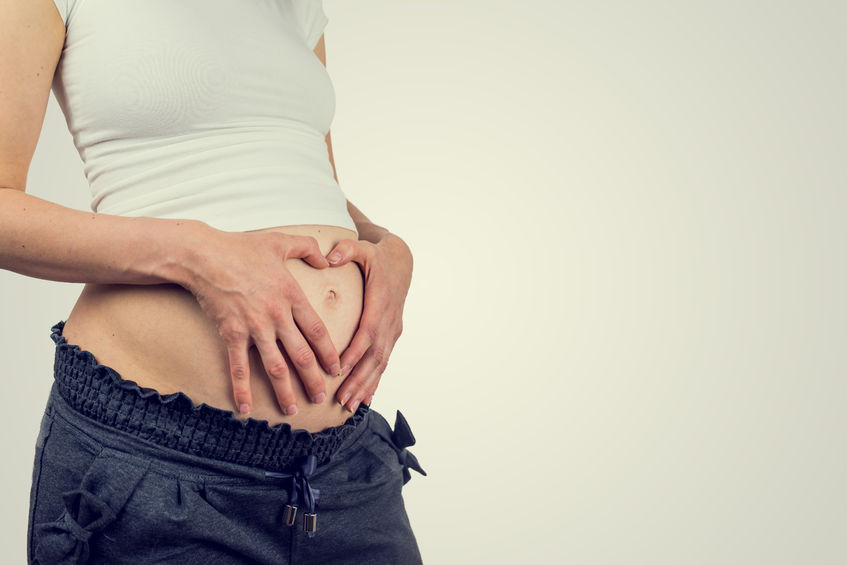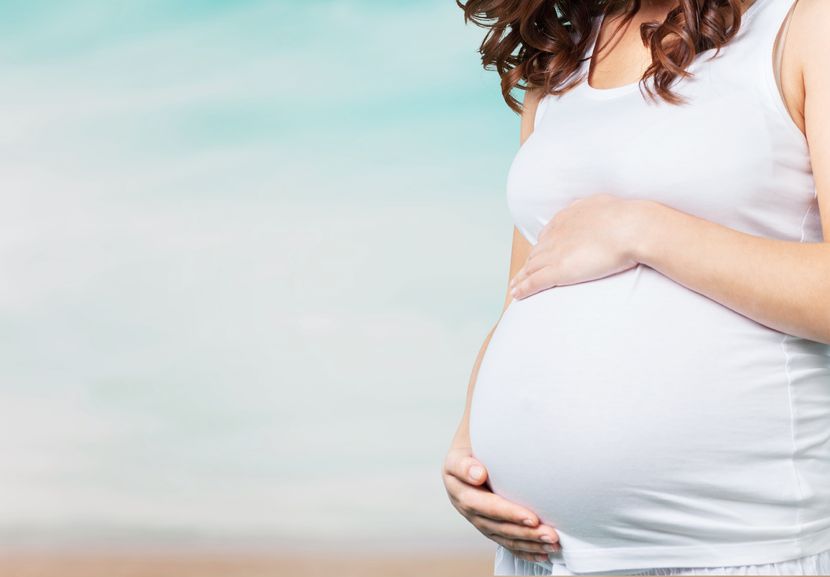The Crazy Things No One Talks About That Happen to Your Body During Pregnancy

They say you can never really understand what it's like to be pregnant until you go through it yourself. Part of this is because of just how many bizarre changes happen to your body during pregnancy, many of which aren't discussed in everyday conversation. "I think women do speak freely about many of the bodily changes of pregnancy—showing, gaining weight, swollen feet—but there are so many others that women don't feel comfortable speaking about because they're embarrassed," says Sara Twogood, MD, an OB/GYN at the University of Southern California and founder of the postpartum care package service Après Push. "Women don't want to admit that they have so much vaginal discharge that they keep thinking they broke their water (happens all the time). They don't want to admit to urinary incontinence," she says.
In part, American culture is to blame for the lack of conversation surrounding pregnancy. "Society has often idealized a culture that embraces motherhood; however, they cannot tolerate the negative associations that come with the journey of pregnancy and postpartum stages," explains Jessica A. Shepherd, MD, an OB/GYN, Director of Minimally Invasive Gynecology at the University of Illinois at Chicago and SweetSpot Labs Expert. When women don't feel as though they're allowed to speak openly about these issues, that leaves everyone in the dark. I know I am personally mystified by the pregnancy process (and desperate to learn more before I go through it myself).
So to get the honest truth about what bodily changes happen during pregnancy, we grilled Twogood, Shepherd, and Fahimeh Sasan, MD, OB/GYN at Mount Sinai and Consultant Medical Doctor at Progyny. "Every pregnant woman experiences different body changes," Sasan reminds us. So remember that while the following changes are common, they don't happen to everyone. Keep scrolling to learn about 16 crazy changes that can happen to your body during pregnancy!
"One of the earliest signs of pregnancy are tender, enlarged breasts," says Shepherd. The nipples in particular can become super sensitive. "Some women have nipple sensitivity so severe they can't wear a bra," adds Twogood. "The soreness usually goes away as a woman progresses into the second trimester, but the fullness remains." We have our hormones to blame for these changes: estrogen, progesterone, and prolactin (the hormone that triggers the body to produce milk). "Nausea and vomiting affect up to 50 to 90% of early pregnancies," says Shepherd. An increase in hormones like human chorionic gonadotropin (hGC) and progesterone are responsible for the queasiness, and pregnancies with higher levels of hCG (like twin pregnancies) are known to experience more frequent bouts of nausea. For a natural nausea treatment, keep a ginger essential oil close by. Pregnancy can have some surprising effects on the skin, including a darkening of the under-eye area, around the nose, and on the upper lip. It's also common to develop hyperpigmentation, especially on women with darker skin tones. Freckles can also get darker, and skin tags might appear on the neck and shoulders, according to Twogood. Oh, hormones. "Some women develop acne or have more breakouts primarily on the face and back," says Sasan. To help, check out Belli's Anti-Blemish Basics kit, which was formulated to be safe for pregnant women. Here's one benefit of early pregnancy: Your nails start growing like crazy. This is thanks to the hormone estrogen, as well as increased circulation, which brings nutrients to your nails at a rapid pace. Less glamorous are constipation and hemorrhoids, which often occur in the first trimester. According to Sasan, both are uncommon and "not a sign of anything bad." For constipation, she recommends trying an over-the-counter stool softener. Also be sure to stay hydrated throughout your pregnancy," she says. Surprising but true: Sasan says that nose bleeds and "bleeding from the gums when brushing your teeth" are also typical symptoms in the first trimester of pregnancy.FIRST TRIMESTER

Your breasts become larger and more sensitive.
Nausea kicks in.
You notice hyperpigmentation and changes in skin texture.
You start breaking out.
Your nails become stronger and thicker.
You have some problems going number two.
You start bleeding in weird places.
SECOND TRIMESTER
Your hair becomes thicker.
This is everyone's favorite pregnancy symptom. Hair can get thicker and fuller. The normal hair cycle of growth, stalling out, then falling out ("resting") is altered during pregnancy. "During pregnancy, hair stays is in the 'growing' phase longer [and] can get thicker and fuller," says Twogood. This is a welcome change for the hair on your head, but the hair on your upper lip, chin, and the rest of your body starts growing more quickly, too. If this bothers you, "stick to plucking and waxing as hair removal creams and bleaches have chemicals you want to avoid during pregnancy," says Sasan.
Your breasts continue to grow.
Women's breasts continue to grow during pregnancy "as the breast tissue prepares for and begins milk production," says Twogood. So expect those things to just keep on inflating.
You experience acid reflux.
As pregnancy goes along, "there are more cases of acid reflux, which is mostly because of the growing uterus, which pushes on the stomach and increases gastric pressure," says Shepherd. If you experience heartburn or indigestion, Sasan says antacids (like Tums) are perfectly okay to take. "Also, eating smaller meals more frequently can help," she says.
THIRD TRIMESTER

Your breathing patterns change.
The immense growth of your uterus during pregnancy causes a "20% increased consumption of oxygen," says Shepherd. Even so, by the seventh month, shortness of breath with exertion, like going up stairs or walking several blocks, is common at this stage in pregnancy. "Be sure to get plenty of rest, stay hydrated, and don't over exert yourself," Sasan advises. "Stretch marks occur on in 90% of [pregnant] women," says Twogood. Also known as striae gravidarum, these marks vary in size, color, and position. According to Shepherd, some stretch marks are white; some are pink, purple, or brown. And they can appear on the abdomen, buttocks, breasts, thighs, or arms. In addition to the rapid stretching of the skin, genetics can contribute to how a woman's stretch marks appear. Massaging cocoa butter onto the belly is one of the most common treatments. Back pain is "extremely common" at this late stage in pregnancy, says Sasan. "Tylenol can help manage any pain, as well as a warm compress. If it's extreme, talk to your doctor." As your body gets closer to delivery, the outer lips of you vagina enlarge. Vaginal discharge also generally increases in the third trimester, according to Sasan. This is a form of hyperpigmentation called linea nigra. Once you're super pregnant, you might see a dark line appear from your belly button down to your pubic bone. Your breasts take on a mind of their own during the third trimester. "Darkening and expansion of the areola of the breast" is typical, says Sasan. In addition, your nipples will probably start leaking. "Most women can express a small amount of milk towards the end of their pregnancy," says Twogood. Source: http://www.byrdie.com/pregnancy-body-changes/slide2You start dealing with stretch marks.
You experience back pain.
Your labia majora swell, and vaginal discharge increases.
A dark vertical line develops on your belly.
The areolas get darker and bigger, and your nipples start leaking milk.
